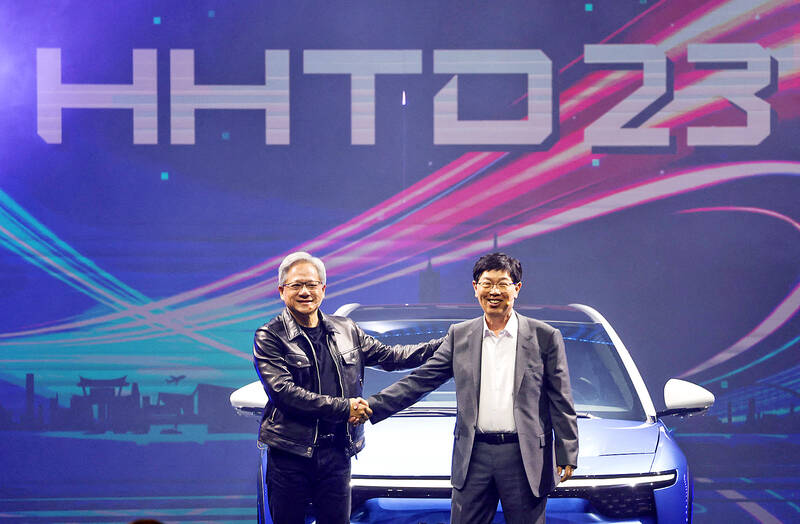Hon Hai Precision Industry Co (鴻海精密) yesterday said it is deepening its partnership with Nvidia Corp by developing next-generation artificial intelligence (AI) platforms and “AI factories” for electric and autonomous vehicles together.
The concepts they are developing could also be applied to industries such as smart manufacturing and robotics, the companies said.
The latest move, announced at the annual Hon Hai Tech Day in Taipei, would help the company realize its electric vehicle (EV) ambitions with a range of solutions using Nvidia’s Drive platform.

Photo: AFP
The companies said that their collaboration on creating “AI factories” would be based on an Nvidia computing infrastructure specially built for processing, refining and transforming vast amounts of data into valuable AI models and tokens.
“Most importantly, Nvidia and Hon Hai are building these factories together. We will be helping the whole industry move much faster into the new AI era,” Hon Hai chairman Young Liu (劉揚偉) said.
“A new type of manufacturing has emerged — the production of intelligence, and the data centers that produce it are AI factories,” Nvidia CEO Jensen Huang (黃仁勳) said. “Hon Hai, the world’s largest manufacturer, has the expertise and scale to build AI factories globally. We are delighted to expand our decade-long partnership with Hon Hai to accelerate the AI industrial revolution.”
Huang said that an AI factory that processes data into intelligence would improve EV software and upgrade entire fleets of vehicles to work more intelligently.
During a question-and-answer session, Young said that Hon Hai would be well-prepared to accept orders from Chinese EV brands once Beijing lifts restrictions that prevent companies from providing vehicle design and manufacturing services on a contract basis.
Hon Hai seeks to expand its global footprint by teaming up with local partners.
“China will relax the outsourcing restrictions sooner or later,” Young said, adding that competition is fierce in China, where about 200 automakers are vying for a piece of the market.
Against that backdrop, Chinese automakers are under heavy pressure and might farm out orders to safeguard their market positions, he said.
In Taiwan, Hon Hai plans to build up capacity to produce 50,000 to 100,000 EVs annually, as it seeks to secure a 10 percent market share with sales of about 400,000 to 450,000 units a year, it said.
The company is in talks with 14 potential customers and has worked on 23 development projects, chief EV strategy officer Jun Seki said.
India and Japan have the potential to become new top EV markets after China, he said.
Hon Hai yesterday unveiled the Model N logistics EV and the mass-production version of its Model B crossover sports utility vehicle (SUV), which it said has been well-received by customers.
The electric Model C SUV would enter volume production next year, as its first customer, Luxgen Motor Co (納智捷), is slated to deliver its N7 model in the first quarter of next year, it said.

US President Donald Trump yesterday announced sweeping "reciprocal tariffs" on US trading partners, including a 32 percent tax on goods from Taiwan that is set to take effect on Wednesday. At a Rose Garden event, Trump declared a 10 percent baseline tax on imports from all countries, with the White House saying it would take effect on Saturday. Countries with larger trade surpluses with the US would face higher duties beginning on Wednesday, including Taiwan (32 percent), China (34 percent), Japan (24 percent), South Korea (25 percent), Vietnam (46 percent) and Thailand (36 percent). Canada and Mexico, the two largest US trading

China's military today said it began joint army, navy and rocket force exercises around Taiwan to "serve as a stern warning and powerful deterrent against Taiwanese independence," calling President William Lai (賴清德) a "parasite." The exercises come after Lai called Beijing a "foreign hostile force" last month. More than 10 Chinese military ships approached close to Taiwan's 24 nautical mile (44.4km) contiguous zone this morning and Taiwan sent its own warships to respond, two senior Taiwanese officials said. Taiwan has not yet detected any live fire by the Chinese military so far, one of the officials said. The drills took place after US Secretary

CHIP EXCEPTION: An official said that an exception for Taiwanese semiconductors would have a limited effect, as most are packaged in third nations before being sold The Executive Yuan yesterday decried US President Donald Trump’s 32 percent tariff on Taiwanese goods announced hours earlier as “unfair,” saying it would lodge a representation with Washington. The Cabinet in a statement described the pledged US tariffs, expected to take effect on Wednesday next week, as “deeply unreasonable” and “highly regrettable.” Cabinet spokeswoman Michelle Lee (李慧芝) said that the government would “lodge a solemn representation” with the US Trade Representative and continue negotiating with Washington to “ensure the interests of our nation and industries.” Trump at a news conference in Washington on Wednesday announced a 10 percent baseline tariff on most goods

THUGGISH BEHAVIOR: Encouraging people to report independence supporters is another intimidation tactic that threatens cross-strait peace, the state department said China setting up an online system for reporting “Taiwanese independence” advocates is an “irresponsible and reprehensible” act, a US government spokesperson said on Friday. “China’s call for private individuals to report on alleged ‘persecution or suppression’ by supposed ‘Taiwan independence henchmen and accomplices’ is irresponsible and reprehensible,” an unnamed US Department of State spokesperson told the Central News Agency in an e-mail. The move is part of Beijing’s “intimidation campaign” against Taiwan and its supporters, and is “threatening free speech around the world, destabilizing the Indo-Pacific region, and deliberately eroding the cross-strait status quo,” the spokesperson said. The Chinese Communist Party’s “threats